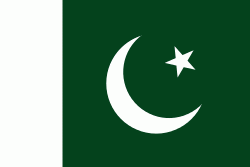Pakistani rupee
₨
The Pakistani rupee ( / ALA-LC: ; sign: Re (singular) and Rs (plural); ISO code: PKR) is the official currency of Pakistan since 1948. The coins and notes are issued and controlled by the central bank, namely State Bank of Pakistan.In Pakistani English, large values of rupees are counted in thousands; lakh (100,000); crore (ten-millions); Arab (billions); kharab (100 billion). Numbers are still grouped in thousands (123,456,789 rather than 12,34,56,789 as written in India)
The word rūpiya is derived from the Sanskrit word rūpya, which means "wrought silver, a coin of silver", in origin an adjective meaning "shapely", with a more specific meaning of "stamped, impressed", whence "coin". It is` derived from the noun rūpa "shape, likeness, image". Rūpaya was used to denote the coin introduced by Sher Shah Suri during his reign from 1540 to 1545 CE.
The Pakistani rupee was put into circulation in Pakistan after the dissolution of the British Raj in 1947. Initially, Pakistan used British Indian coins and notes simply over-stamped with "Pakistan". New coins and banknotes were issued in 1948. Like the Indian rupee, it was originally divided into 16 annas, each of 4 pice or 12 pie. The currency was decimalised on 1 January 1961, with the rupee subdivided into 100 pice, renamed (in English) paise (singular paisa) later the same year. However, coins denominated in paise have not been issued since 1994.
Country
-
Pakistan
Pakistan, officially the Islamic Republic of Pakistan , is a country in South Asia. It is the world's fifth-most populous country, with a population of almost 243 million people, and has the world's second-largest Muslim population just behind Indonesia. Pakistan is the 33rd-largest country in the world by area and 2nd largest in South Asia, spanning 881,913 km2. It has a 1,046 km coastline along the Arabian Sea and Gulf of Oman in the south, and is bordered by India to the east, Afghanistan to the west, Iran to the southwest, and China to the northeast. It is separated narrowly from Tajikistan by Afghanistan's Wakhan Corridor in the north, and also shares a maritime border with Oman. Islamabad is the nation's capital, while Karachi is its largest city and financial centre.
Pakistan is the site of several ancient cultures, including the 8,500-year-old Neolithic site of Mehrgarh in Balochistan, the Indus Valley civilisation of the Bronze Age, the most extensive of the civilisations of the Afro-Eurasia, and the ancient Gandhara civilization. The region that comprises the modern state of Pakistan was the realm of multiple empires and dynasties, including the Achaemenid; briefly that of Alexander the Great; the Seleucid, the Maurya, the Kushan, the Gupta; the Umayyad Caliphate in its southern regions, the Hindu Shahis, the Ghaznavids, the Delhi Sultanate, the Mughals, the Durranis, the Omani Empire, the Sikh Empire, British East India Company rule, and most recently, the British Indian Empire from 1858 to 1947.
